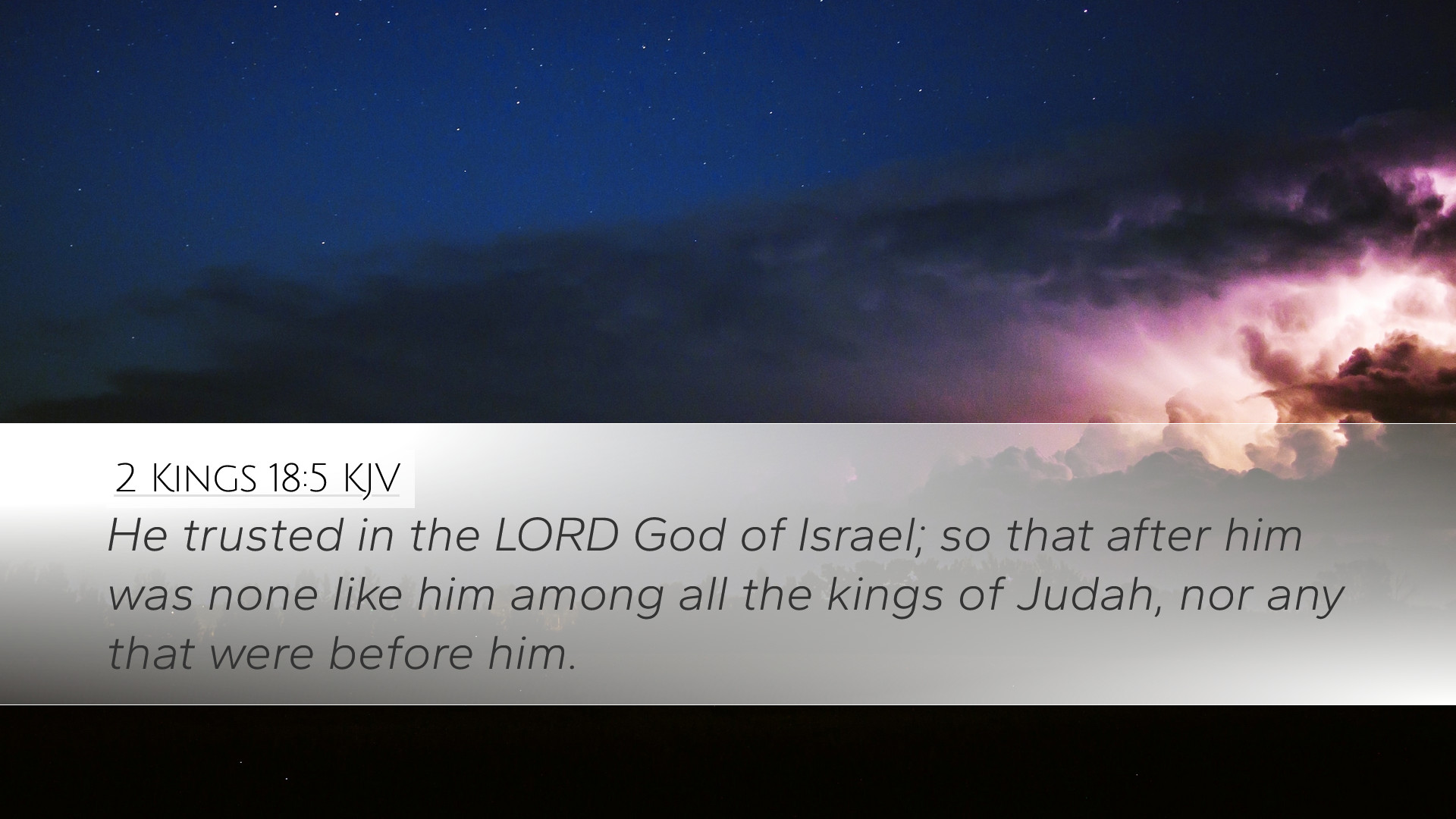Commentary on 2 Kings 18:5
2 Kings 18:5 states, "He trusted in the Lord God of Israel; so that after him was none like him among all the kings of Judah, nor any that were before him." This verse introduces us to King Hezekiah, a notable figure in the history of Judah, celebrated for his unwavering faith and reforms that revived the worship of Yahweh. Below is a synthesis of insights from public domain commentaries that highlight the significance of Hezekiah's trust in God.
Overview of Hezekiah's Reign
Hezekiah assumed the throne during a tumultuous period, with the kingdom of Judah threatened by external powers and internal discontent. His reign, marked by significant military and spiritual challenges, is foundational for understanding the dynamics of faith within the monarchy.
The Nature of Hezekiah's Trust
Matthew Henry emphasizes that Hezekiah’s trust in the Lord was not merely a passive confidence; it was active and based on his acknowledgment of God’s sovereignty. Trusting in God involved both personal faith and reliance on divine assistance during the Assyrian threat:
- Spiritual Trust: Hezekiah sought to align Judah’s policies with the teachings of the Torah, indicating a deep, contemplative faith.
- Practical Measures: The king fortified Jerusalem, demonstrating his faith by taking tangible steps in conjunction with prayer and supplication.
Albert Barnes notes that Hezekiah’s trust was unique among his predecessors:
- His reforms included the removal of high places, and idols, and a return to the worship of the one true God.
- Barnes highlights that Hezekiah’s faith was characterized by humility and a profound belief in God’s power to deliver.
Comparative Analysis of Trust in Leadership
When comparing Hezekiah to other kings, Adam Clarke remarks on the unique nature of his faith:
- Unlike his father Ahaz, who engaged in idolatry and aligned with foreign powers, Hezekiah’s leadership exemplified a restoration of covenant faithfulness.
- Clarke suggests that Hezekiah's singular trust in God was foundational for his successful reforms and military achievements.
Theological Implications
The verse indicates a pivotal theological principle: the role of trust in divinely appointed leadership.
- Divine Favor: Hezekiah's faith resulted in God's favor, which manifested in miraculous deliverances, such as the defeat of Sennacherib's army.
- Historical Context: Hezekiah’s reign serves as a model for leaders; trust in God is paramount for national and personal integrity.
Lessons for Modern Readers
The implications of Hezekiah's trust are profound for contemporary believers, particularly pastors and theologians. The call to place trust in God amidst adversities, to reform personal and communal worship, remains relevant:
- Active Faith: Believers are encouraged to back their faith with action, much like Hezekiah did in fortifying Jerusalem.
- Worship as a Priority: Hezekiah prioritized the worship of God over political alliances, a significant lesson in today’s pluralistic society.
- Intercessory Prayer: Hezekiah’s reliance on prayer during crises teaches modern Christians the importance of seeking God’s intervention in difficult times.
Conclusion
2 Kings 18:5 encapsulates the essence of Hezekiah's reign characterized by total reliance on the Lord. He became a paragon of faithfulness among the kings of Judah, illustrating a profound truth: leadership grounded in trust in God can lead to monumental change and deliverance. As we reflect on this passage, may we draw inspiration from Hezekiah's life and apply his principles of faith, action, and worship in our own contexts.


